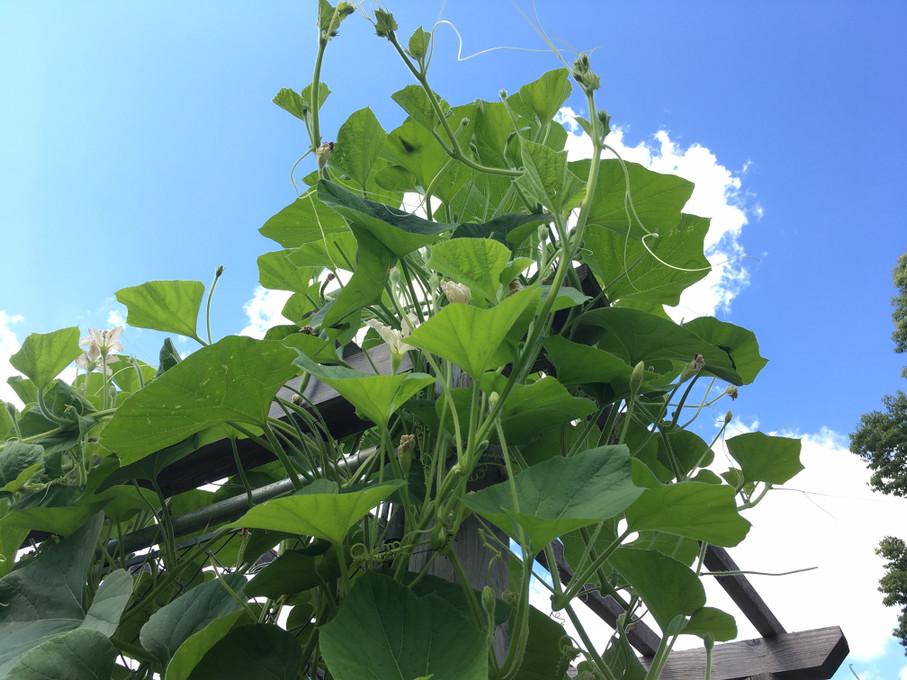
Success with Zucchetta
Posted by Seeds from Italy on 7th Apr 2020
We recently asked our customers to tell us about their favorite zucchini varieties. Quite a few people mentioned two varieties that technically aren't zucchini at all — they are known as Zucchetta. But the flavor is comparable and perhaps even better than most zucchinis. And they are not subject to the common problems of summer squash such as squash bugs and powdery mildew. In appearance, they differ from zucchini in one crucial respect — they are enormous plants that require either a sturdy trellis or a lot of space to sprawl. On a trellis, the fruits will be long and straight; on the ground, they will curl and curve. They are sometimes called pergola squash because they are perfect for growing on a pergola, providing dense shade.
The two varieties are Serpent of Sicily and Tromba d'Albenga. Both are popular Italian heirlooms with a lot to offer American gardeners.
Serpent of Sicily is actually a member of the gourd family (Lagenaria siceraria). The fruits can grow to 3 feet long and if left to mature will in fact become hard-shelled like gourds. Italians eat them when they are much smaller, though, as small as 6 inches. At that point, they cook up much like zucchini. Serpent of Sicily is known by so many names in Italy, including Cucuzza and Zucchetta da Pergola, a reference to the structure it will cover over the course of the growing season. It has white flowers and large soft leaves. The seeds are somewhat rectangular and have an extremely hard shell — many people soak them overnight or even scratch them with sandpaper to aid germination.
Pat Corpora of Bethlehem, PA, explains how to succeed with Serpent of Sicily: "It starts with finding a sunny spot where I can build a trellis or arbor for these aggressive climbers to grow. I don’t bother to scrape the seed shells or soak the seeds. They germinate just fine if the soil is wet and warm. I fill a good size hole with organic leaf compost and plant 3-4 seeds in each spot.
"When seeds germinate I train them to grow on the trellis or arbor, although they manage just fine on their own. One important and delicious element is to prune the side growing tips of the vine and sauté them in olive oil. They are delicious and keeps the vine from getting overly bushy. Otherwise, I pick most of the cucuzza when it is 12-18 inches long. My favorite preparation is sautéed with onion, garlic and tomato sauce, and eaten with some homemade crusty bread. I do leave a couple of cucuzza on the vine, letting them grow to 3-4 feet. They become the center of attention in the neighborhood." See Pat's trellis here:

Tromba d'Albenga (Cucurbita moschata) is also a huge vining plant that produces many fruits, which are firmer and nuttier flavored than summer squash. It is known in Italy as Tromboncino.
Juan Laos of Moraga, CA, describes his fantastic experience with growing Tromboncino: "It is a delicious, firm summer squash when picked young like zucchini but much firmer with a better flavor as well as a tasty winter squash that keeps all winter. The flowers are also tasty battered and fried! It is very prolific and sprawling and also very beautiful to look at as it is growing.
"I use the three sisters method of growing. I plant corn, pole beans and squash together with the corn in the middle, beans immediately around the corn 12 inches and the squash alternating between the beans. This system has worked very well for me for many years and I do not have to amend at all other than occasional worm castings and a cover crop in the winter which I sheet mulch with some compost and composted manure in the spring and then plant directly into it. The beans fix nitrogen and provide adequate fertilizer as the season goes on. I sometimes add a 4th plant, mammoth sunflowers. I love the tromboncino as it sprawls out of my garden and into some young oak trees adjacent and downhill. As the squash grow, the vines climb the tree and the squash end up hanging out of the tree! This makes them easy to pick and it looks pretty amazing. I have gotten lots of comments from friends and neighbors."
Here at Seeds from Italy, we always grow one or the other of these varieties in our gardens, with the same excellent results. We can assure you that gardeners coast to coast love growing and eating these unusual squash. We hope you'll give them a try!
